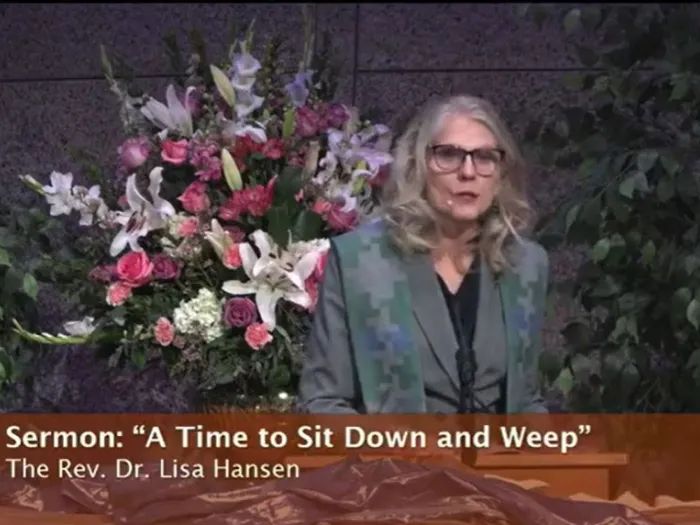The fight for 12
Grassroots campaign to standardize 12 weeks of paid family leave goes back years

This spring, an amendment to the Book of Order’s section G-2.0804 (TERMS OF CALL) was ratified by the presbyteries. The historic vote mandating a minimum of 12 weeks of paid family leave for called and installed pastors at congregations is the culmination of a six-year story of General Assembly process, but also of grassroots church advocacy.
With the amendment settled, it’s now time for mid councils and congregations to implement the policy, and for those hoping to raise minimum levels of care for families of all PC(USA) workers to look to the future.
The Rev. Bethany Benz-Whittington talked with the News Service about the grassroots effort leading up to the amendment’s passage, recounting her part in that history while emphasizing the leadership of two other women — the Rev. Hailey Malcolm and Ruling Elder Contina Lundy — and the help of many others backing the change.
In 2014, the General Assembly approved an overture “encouraging” six weeks of paid family leave across the denomination. That left it up to councils to decide what amount to provide, if any.
Voices against requiring a standardized minimum claimed that FMLA (the Family Medical Leave Act) already supported young families and that an outsized financial burden would be placed on small churches. Some at national agencies argued church assets shouldn’t support paid family leave because of fiduciary responsibilities to preexisting church programs, investors and pensioners.
While serving a church call in Colorado, Benz-Whittington was a member of Young Clergy Women International, a group already discussing the terms of pastor contracts. Many young women pastors felt pressure to trade family leave guarantees for a higher salary. In Benz-Whittington’s case, she didn't feel like she could ask for more money from the church because she had asked for 12 weeks paid leave.
“I was grateful the congregation gave me 12 weeks,” she said. “Most pastors didn’t get that.”
A month into Benz-Whittington’s call a different pastor posted on Facebook that she was receiving two weeks of family leave, creating a viral backlash that inspired Benz-Whittington and others to draft an overture for the 223rd General Assembly in 2018 requiring 12 weeks.
“Advocacy is a big part of my faith journey,” she said, before describing herself as a “polity geek.” She wrote an overture to the General Assembly when she was 19. Although it didn’t pass, the experience showed her how changes in PC(USA) policy and governance could connect to sustained campaigns by grassroots organizers.
“I wrote the language of the 2018 overture itself,” Benz-Whittington said. “Three or four others wrote the rationale. Then we had to get it through presbyteries, which meant collecting more people.”
Phone calls and emails to presbytery contacts resulted in nine concurrences, with Boston Presbytery sponsoring the overture. In the end three family leave overtures were placed on the docket of the 2018 General Assembly.
Benz-Whittington felt frustrated by discussions during the Church Polity and Ordered Ministry Committee, which ended with a reduced recommendation of eight weeks going to the full assembly. Plenary answered that change and the related family leave overtures with a Family Leave Policy Task Force (which would include Malcolm as a member and Lundy as co-moderator) tasked with making its own recommendation to the 224th General Assembly in 2020.
Those involved in the grassroots movement backed the task force’s eventual recommendation, which included an amendment to the Book of Order establishing 12 weeks as the minimum paid family leave to be included in all terms of call. After referral from the virtual 224th General Assembly in 2020, the Health, Safety, and Benefits Committee at the hybrid 225th General Assembly amended the task force report, recommending to plenary that a family leave policy be included in all terms of call, but deleting any language establishing a minimum amount.
Benz-Whittington and the grassroots supporters sprang into action, providing resources and guidance to commissioners who sought to reinsert the language of 12 weeks during plenary.
It did not take long for plenary discussion to turn towards the topic of a mandatory length.
“The third person in line got called to make the amendment,” Benz-Whittington said. To her surprise, the changed language passed easily. “No one spoke against it.”
The assembly then proceeded to a vote and the main motion — with the 12-week minimum reinserted — passed 346 to 33. “I was in my guest bedroom watching this all on computer,” Benz-Whittington said. After a start-stop five years, “the whole thing went so fast.”
A motion to reconsider was brought to a vote but failed. The restored overture, with language reading “The call shall include provision for a minimum of 12 weeks paid family medical leave and participation in the benefits plan of the Presbyterian Church (U.S.A.)” would be sent to the presbyteries for their vote.
“We all celebrated on Zoom,” Benz-Whittington said. “Then we immediately began talking about organizing presbyteries.” Eighty-four would need to approve the amendment for it to be entered into the Book of Order.
“I was all over Facebook finding out attitudes of presbyteries. We found people to work with them and in November I started a spreadsheet tracking the vote count. People would contact me from presbyteries saying things had passed. I had information before Kate!” (Ruling Elder Kate Trigger Duffert, Manager for General Assembly Business and Per Capita in the Office of the General Assembly, has been tracking all amendment votes from the 225th General Assembly.)
During the months of voting, Benz-Whittington saw PC(USA) millennials on social media frequently discussing the amendment and wanting to find out more. Ruling Elder Jodi Craiglow turned Benz-Whittington’s spreadsheet into a website. “There, anyone could see the tally of votes needed for passage,” Benz-Whittington said. “I was very intentional about making each presbytery’s vote public. Young pastors were and are watching closely.
“I was tracking it every day. As ratification approached in late winter, I posted in the group we’re five away, four away.
“I was looking at the website on a Monday night when it was at 82, 83 votes. Tuesday is typically the day for presbytery meetings. Western North Carolina was the vote that did it. Rev. Megan McMillan from Mills River Presbyterian Church posted that we had the needed 84.”
The ratifying presbytery vote was taken at Anderson Auditorium at Montreat. Benz-Whittington said that for someone like her who was raised in the Southern church “the power and significance of the place was amazing.”
Once ratification was official, “I began plastering the image all over social media,” she said.
The amended language will now be included in the Book of Order and go into effect July 9 as outlined in G-6.04.e. Trigger Duffert told the News Service there are resources available for presbyteries and congregations looking to implement the new family leave policy.
“The Family Leave Task Force did an outstanding job discerning how best to provide for just care of pastors while recognizing the challenges of funding ministry,” she said. “Their report includes both a powerful rationale to help the church at large understand the need for family leave, as well as a sample policy that presbyteries may use to help draft their own language.”
Trigger Duffert also noted that many presbyteries have existing policies providing for 12 weeks or more paid family leave. “This is one of those beautiful moments for the connectional church to shine,” she said. “While some are new to creating family leave policies, others have both created policies and implemented them in ways that can serve as a guide for other mid councils.
“I’ve heard from many leaders about the ways they are already meeting this need. Some have removed the financial burden of providing pulpit supply through a rotating list of volunteer elder preachers. Other presbyteries have established a shared fund to which congregations and individuals can make donations that helps make sure all pastors can receive this benefit, regardless of the congregation’s budget.”
While congregations and mid councils can use each other as resources, Trigger Duffert emphasized that, “there are people in the national offices who are available and eager to support the church through the changes that emerge from the assembly.”
Family Leave will be just one change to the constitution in 2023. Trigger Duffert reported that all amendments to the Book of Order were ratified earlier this month.
Benz-Whittington left parish ministry years ago, during a period of family leave. She now runs her own business, Sacred Calls, training church leaders and providing progressive Christian education. From her home in in Maryville, Tennessee, where she lives with her children and husband, a pastor at Highland Presbyterian Church, she works with sessions, deacons, commissions and committees on ministry and preparation for ministry.
Like Malcolm and Lundy, she will see no personal benefit from the change to the Book of Order. And yet she feels tremendous joy at what it means for other young families in the church. A pastor friend on a contract at Decatur Presbyterian Church in Georgia recently had a baby. She texted Benz-Whittington to say that the session had retroactively applied the amendment to her employment, changing what would have been 6 weeks of paid family leave to 12.
Like Trigger Duffert, Benz-Whittington noted the approaching July 9 date when the 12-week paid family leave policy officially begins. Sessions and presbyteries can take action even sooner, as happened in Decatur.
As for the grassroots team, their efforts to help church families are far from complete.
“We are very concerned about things we cannot control [via the amendment wording],” Benz-Whittington said, “including family leave for church staff. A next step is addressing everyone who is a church staff member, not just installed pastors.” The task force recommendation itself draws attention to this disparity: “While this specific recommendation provides for called and installed pastors, the task force would urge adoption of this same provision of care for all PC(USA) workers.”
“Our theology doesn’t allow for hierarchy, yet we have created it at every level,” Benz-Whittington said before listing some of common ones at congregations and mid councils: “head pastor vs. associate pastor, executive presbyter vs. stated clerk.”
“We’re not just working on family leave here,” she added. “These are all steps toward building the kin-dom of heaven.”
For now, Benz-Whittington believes helping congregations figure out how to implement the 12-week minimum paid family leave standard for pastors should be a denominational priority. She specifically mentioned that Ruling Elder JoAnne Sharp and others on the Advocacy Committee for Women and Gender Justice are producing materials that will help churches with this work.
“How do we make this cost-neutral for churches?” Benz-Whittington asked. “Do we help them through with pastoral leadership when someone is on leave?”
Two more questions about family care a future General Assembly could address.
You may freely reuse and distribute this article in its entirety for non-commercial purposes in any medium. Please include author attribution, photography credits, and a link to the original article. This work is licensed under a Creative Commons Attribution-NonCommercial-NoDeratives 4.0 International License.




